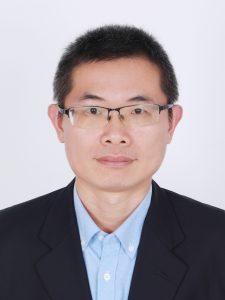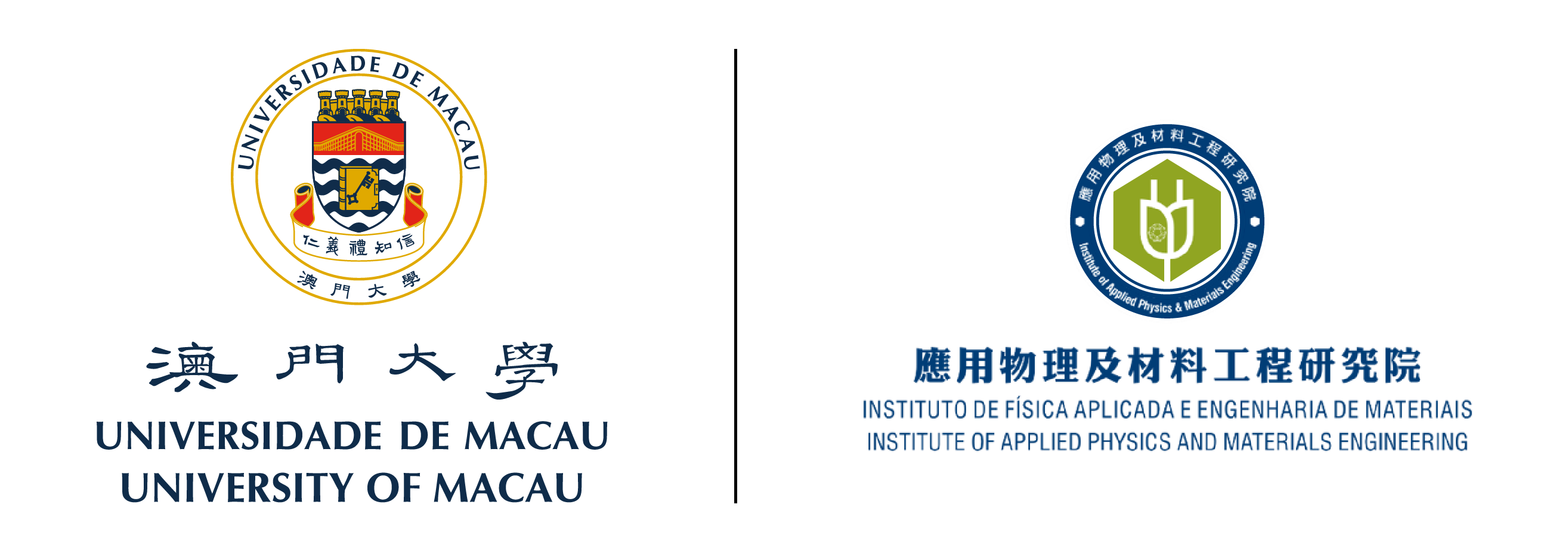
Affiliation
Institute of Applied Physics and Materials Engineering
Email (@um.edu.mo)
Tel
Office
University of Macau
Avenida da Universidade
Taipa, Macau, China
Personal Website
CAI Yongqing 蔡永青
Assistant Professor, Institute of Applied Physics and Materials Engineering
Academic Qualifications
M.S., Materials Science, Northwestern Polytechnic University, China, 2007.
B.S., Materials Science, Northwestern Polytechnic University, China, 2004.
Research Interests
- Simulating phonons and other quantum quasiparticles in condensed matters;
- Molecular dynamics;
- Materials informatics and machine learning potential.
Representative Publications
1. Devesh R Kripalani, Qiye Guan, Hejin Yan, Yongqing Cai*, and Kun Zhou*, Ferroelasticity in two-dimensional hybrid Ruddlesden–Popper perovskites mediated by cross-plane intermolecular coupling and metastable funnel-like phases. ACS Nano 18, 14187–14197 (2024).
2. Zian Xu, Jian Zhu, Zheng Shu, Yu Xia, Rouxi Chen*, Shaoqing Chen, Yu Wang, Lin Zeng, Jiacheng Wang, Yongqing Cai*, Shi Chen*, Fuqiang Huang*, and Hsing-Lin Wang*, Phosphorus-induced anti-growth of ruthenium clusters-single atoms for ultra-stable hydrogen evolution over 100,000 cycles. Joule 8, 1-14 (2024).
3. Xiangyue Cui,Hejin Yan, Xuefei Yan, Kun Zhou, Yongqing Cai*, Promoted electronic coupling of acoustic phonon modes in doped semimetallic MoTe2. ACS Nano 17, 16530–16538 (2023).
4. Zheng Shu, Hongfei Chen, Xing Liu, Huaxian Jia, Hejin Yan, and Yongqing Cai*, High-throughput screening of heterogeneous transition metal dual-atom catalysts by synergistic effect for nitrate reduction to ammonia. Adv. Funct. Mater. 2301493 (2023).
5. Tingting Yin*, Hejin Yan, Ibrahim Abdelwahab, Yulia Lekina, Xujie Lü, Wenge Yang, Handong Sun, Kai Leng, Yongqing Cai*, Ze Xiang Shen*, and Kian Ping Loh*, Pressure driven rotational isomerism in 2D hybrid perovskites. Nature Commun. 14, 411 (2023).
6. Yan Shao, Wei Gao, Hejin Yan, Runlai Li, Ibrahim Abdelwahab, Xiao Chi, Lukas Rogée, Lyuchao Zhuang, Wei Fu, Shu Ping Lau, Siu Fung Yu*, Yongqing Cai*, Kian Ping Loh*, and Kai Leng*, Unlocking surface octahedral tilt in two-dimensional Ruddlesden-Popper perovskites. Nature Commun. 13, 138 (2022).
7. Kangdi Niu, Guotao Qiu, Chuanshou Wang, Daiyue Li, Yutao Niu, Songge Li, Lixing Kang, Yongqing Cai*, Mengjiao Han*, Junhao Lin*, Self-intercalated magnetic heterostructures in 2D chromium telluride. Adv. Funct. Mater. 33, 2208528 (2022).
8. Devesh R. Kripalani, Yongqing Cai*, Jun Lou, and Kun Zhou*, Strong edge stress in molecularly thin organic–inorganic hybrid Ruddlesden–Popper perovskites and modulations of their edge electronic properties. ACS Nano 16, 1, 261–270 (2022).
9. Jiaren Yuan, Yuanping Chen, Yuee Xie, Xiaoyu Zhang, Dewei Rao, Yandong Guo, Xiaohong Yan*, Yuan Ping Feng*, and Yongqing Cai*. Squeezed metallic droplet with tunable Kubo gap and charge injection in transition metal dichalcogenides. Natl. Acad. Sci. U S A 117, 6362-6369 (2020).
Teaching Areas
Undergraduate Courses
GREEN ENERGY FOR GLOBAL SOCIETY (GEGA1006), Undergraduate, University of Macau, Spring semester (2020, 2021, 2022), Fall Semester (2020);
LOW-DIMENSIONAL PHYSICS (APAC3007), Undergraduate, University of Macau, Fall Semester (2021, 2022, 2023).
THEORY AND MODELING OF MATERIALS PROPERTIES (APAC4009), Undergraduate, University of Macau, Spring Semester (2023, 2024).
Awards and Honors
2020 The National Science Fund for Excellent Young Scholars (Hong Kong & Macau), China
2014 Institute Best Paper Award, Institute of High Performance Computing, A*STAR, Singapore
2007 Distinguished Master Thesis, Northwestern Polytechnic University, China
2004 Distinguished Bachelor Thesis, Faculty of Materials, Northwestern Polytechnic University
2002 1st level, Advanced Mathematics Competition, Shaanxi Province, China
Aug 2019-present
Assistant Professor, Institute of Applied Physics and Materials Engineering, University of Macau
Mar 2019-Jul 2019
Scientist III, Institute of High Performance Computing, A*STAR, Singapore
Mar 2016-Feb 2019
Scientist II, Institute of High Performance Computing, A*STAR, Singapore
Jan 2013-Feb 2016
Scientist I, Institute of High Performance Computing, A*STAR, Singapore
Mar 2012-Dec 2012
Research Fellow, Physics Dept., National University of Singapore, Singapore
Aug 2011-Feb 2012
Research Associate, Physics Dept., National University of Singapore, Singapore
Several RA/PhD/Postdoc vacancies on computational materials and physics are available.
PhD:
The candidate should have obtained grades in his/her Bachelor and Master educations with solid background in solid state physics and quantum mechanics. Any programming experience (e.g. Python, Matlab, and Fortran) will be an advantage.
(1) There are two types of PhD stipends provided by the UM:
- UM Macao PhD Scholarship: UM Macao PhD Scholarship provides each awardee with a monthly stipend of MOP20,000 for a period up to 4 years.
- The PhD Assistantship: The PhD Assistantship, supported by either UM centralized funding or principal investigator (PI)’s research funding, provides each new recipient with a starting monthly stipend of MOP12,500 (up to MOP14,000).
(2) Application procedures and important dates:
The scholarships for the PhD degree are subject to academic approval, and the candidates will be enrolled at the Institute of Applied Physics and Materials Engineering (IAPME) at UM. For information about the general requirements for enrollment and the procedures for applications, please see https://grs.um.edu.mo/. Usually there are two batches (October-November; January-February) for application for Autumn admission.
Postdoc:
Postdoc candidates are encouraged to apply the following two types of Postdoctoral centrally funded by University of Macau:
a). UM Macao Postdoctoral Fellowship (UMPF, Class A): Monthly remuneration of MOP40,000 (taxable). Annual conference and research related trips allowance of MOP20,000; Maximum contract period of 2 years.
b). UM Macao Postdoctoral Associateship (UMPA, Class B): Monthly remuneration of MOP28,000 (taxable). Annual conference and research related trips allowance of MOP14,000, Maximum contract period of 2 years.
Remark: 1 MOP ~= 0.8 RMB; 1 MOP ~= 0.11 Euro; 1 MOP ~= 0.12 USD;
(1) Eligibility
- The UM Macao Postdoctoral Fellowship and Associateship are awarded to PhD degree holders who have graduated within 2 years, or PhD students who are expected to graduate within 6 months from the application date.
- Applicants should have proven record of outstanding academic achievements, including publications, and academic awards etc.
- Applicants for UMPF should possess a PhD degree from top ranked universities or disciplines (i.e., Top 200 ranked universities listed in the THE/QS ranking, or those listed under the Double First-Class Initiatives and Programs in Mainland China).
(2) Important Dates
- Deadline for application: 6 May
- Submission of faculty-level assessment results to RSKTO: 27 May
- Final assessment result announcement date: 17 Jun
(3) Application Procedure
- Applicants shall submit applications through the online application system (https://isw.um.edu.mo/tpms/).
(4) For more information
https://rskto.um.edu.mo/mpf_mds/#02
Please contact Prof. Cai for more details and information if you are interested.
Computing facilities:
We are accessible to the high-performance computing cluster (HPCC) at the campus of the UM (for details please refer to https://icto.um.edu.mo/teaching-learning-research/high-performance-computing-cluster-hpcc/). In addition, our group has 6 workstations with each 44 cores which are shared among roughly ten members.
Software:
Currently, our group has the licenses for the following packages:
(1) Vienna Ab initio Simulation Package (VASP)
(2) Wien2k
(3) Quantum-ATK

